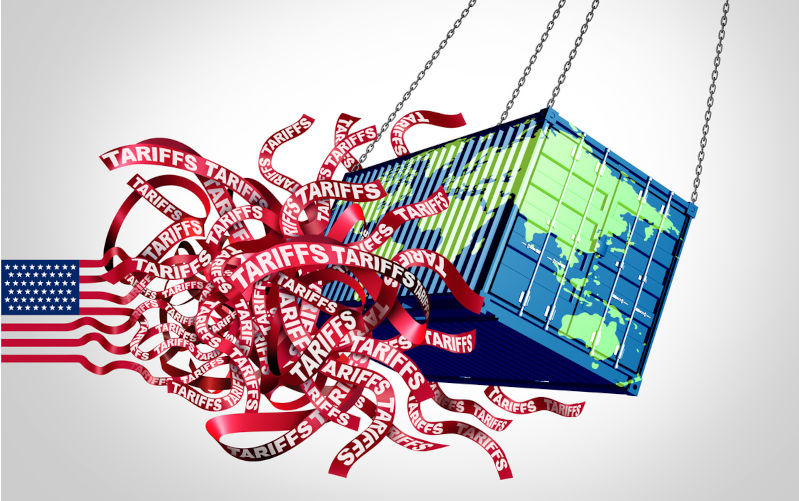Asia’s response to a leaderless trading system
August 27, 2025
Policy uncertainty reshapes trade slowly and then suddenly. The investments that build trade relationships are long-term choices.
Supply contracts are often for 10 years or longer. While the consequences of the second Trump administration will unfold over decades, the chaos is already palpable. Firms and governments are being forced to react now.
To meet common challenges, the region needs co-operation frameworks that can function without a great-power leader. Despite the Trump trade shocks and the spillover of trade diversion from China, ASEAN governments have shown leadership on multilateralism which they can continue to build upon.
US tariff rates will wax and wane, but elevated uncertainty is the new normal. The leading trade policy uncertainty index has never returned to its pre-2016 median. Even under former US president Joe Biden, Trump 1.0’s tariffs generally stuck and new ones were added. Under Trump 2.0, US companies are postponing or cancelling long-horizon investment because of trade risks. While a future administration might stabilise Washington’s approach, it will take years, and likely a major international accord or congressional shift, for confidence and credibility in US trade policy to return.
Exposure to the tariff shock varies, but no economy is immune. Roughly 30% of Cambodia’s and 25% of Vietnam’s GDP come from exports to the US. Even in less directly US-oriented economies like Australia or Indonesia, sensitive sectors remain at risk and leaders fret about Washington’s next move. Resilience to uncertainty is thus a collective project.
Government responses demonstrate the seriousness of the expected macroeconomic impact. Indonesia, Malaysia and Thailand introduced assistance packages before the tariff pause expiry. Vietnam extended a VAT cut to 2026. Central banks around the region lowered policy rates.
Competition from rising Chinese imports adds to this pressure. Since 2023, more of China’s exports by value have gone to ASEAN than to the US or Europe. Industries like furniture, garments and steel in several ASEAN economies have suffered significant disruption, prompting some countries to adopt or extend anti-dumping measures amid growing calls for broader protection.
Most smaller countries have wisely avoided retaliating against the US and have sought negotiations. The ASEAN Economic Ministers’ joint statement on 10 April 2025 pledged no retaliation, welcomed dialogue and reaffirmed support for the multilateral trading system – a timely and powerful affirmation of the region’s long-term interests.
China, combining retaliation with talks and concessions, is an exception. Its size and the difficulty of substituting many Chinese exports give Beijing the means and incentive to retaliate. Its most constructive way is to use WTO processes and widen market access for non-US partners. Whether Beijing has the desire or capacity to assume leadership in rehabilitating the multilateral trading system is unclear.
Some countries like Cambodia or Vietnam have pursued and secured bilateral deals with Washington out of economic imperative. There is no unified regional regime governing these negotiations, which chafe against states’ multilateral commitments. The result has been a spate of hasty, non-binding announcements to appease Trump, which officials must then present as steps towards legitimate agreements.
Responding collectively, such as through ASEAN-centred groupings, adds weight but is not always possible since Washington can refuse engagement. But quietly co-ordinated pressure offers the best defence against the most harmful US demands, like its pressure on Vietnam and others to slash Chinese-origin content. Such demands are costly and threaten the role of non-aligned bridge economies, vital in avoiding a return to 1930s-style trade blocs.
Illicit trans-shipment is a real problem that governments want to address, but US complaints extend beyond actual customs fraud. The White House expects rules of origin — methods for determining a product’s country of origin — to be up for negotiation. These rules can be highly subjective and risk being weaponised to bifurcate supply chains.
Economically, the best defence is to use regional integration to resist protectionism. Modelling from the East Asian Bureau of Economic Research and the Centre for Strategic and International Studies suggests that US tariffs like those announced in April 2025 would directly cut ASEAN real GDP by 2.3%. If contagion pushed global tariffs to 15%, the outlook would be far bleaker still, reducing regional output by over 11%. Yet, if other countries retaliate but ASEAN fully implements the Regional Comprehensive Economic Partnership, that loss turns into a 1.9% GDP gain, driven by intra-regional trade and production substitution from China, Europe and India.
Investing in and improving the processes for deepening and expanding RCEP and the Comprehensive and Progressive Agreement for Trans-Pacific Partnership are the region’s most effective insurance policies. In RCEP, aligning tariff schedules among members and simplifying rules of origin are two important areas to start. This also adds political heft to RCEP’s still-nascent economic cooperation component.
Most countries want co-operation that drives green growth and improves resilience to shocks. Ideally, these agendas would advance within WTO processes, but consensus obstacles mean progress there will be slow and uneven. Practical gains must come through issue-specific plurilateral initiatives, preferably structured so that any country demonstrating commitment can join. The deeper challenge is to build a multilateral trading system that functions with or without hegemonic sponsorship.
The US now accounts for only about 11% of global goods trade. Other economies can decide how far rules or power will govern the remaining 89%. By reinforcing multilateral principles, accelerating regional agreements and advancing co-operation on resilience and energy transition, Asia can mitigate uncertainty while keeping an open door should Washington reengage.
Republished from East Asia Forum, 24 August 2025
The views expressed in this article may or may not reflect those of Pearls and Irritations.

